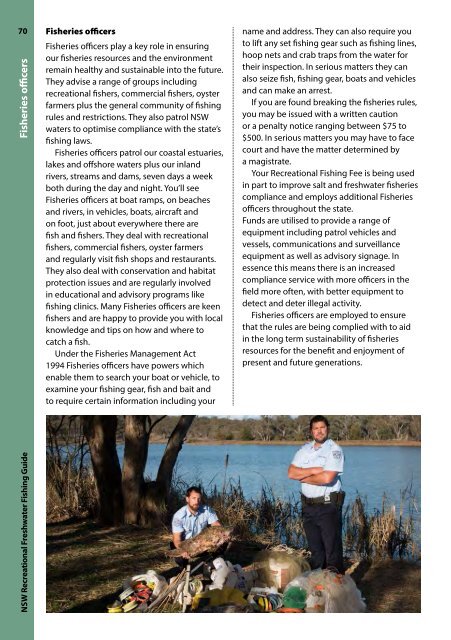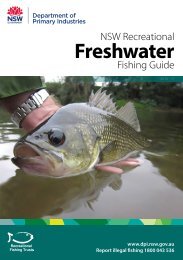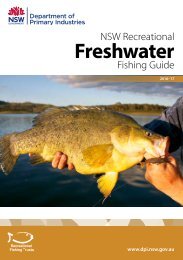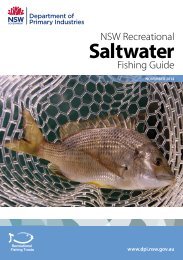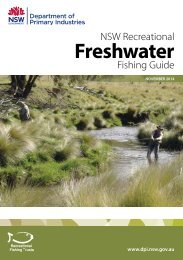freshwater-recreational-fishing-guide-2016-17
Create successful ePaper yourself
Turn your PDF publications into a flip-book with our unique Google optimized e-Paper software.
70<br />
NSW Recreational Freshwater Fishing Guide<br />
Fisheries officers<br />
Fisheries officers<br />
Fisheries officers play a key role in ensuring<br />
our fisheries resources and the environment<br />
remain healthy and sustainable into the future.<br />
They advise a range of groups including<br />
<strong>recreational</strong> fishers, commercial fishers, oyster<br />
farmers plus the general community of <strong>fishing</strong><br />
rules and restrictions. They also patrol NSW<br />
waters to optimise compliance with the state’s<br />
<strong>fishing</strong> laws.<br />
Fisheries officers patrol our coastal estuaries,<br />
lakes and offshore waters plus our inland<br />
rivers, streams and dams, seven days a week<br />
both during the day and night. You’ll see<br />
Fisheries officers at boat ramps, on beaches<br />
and rivers, in vehicles, boats, aircraft and<br />
on foot, just about everywhere there are<br />
fish and fishers. They deal with <strong>recreational</strong><br />
fishers, commercial fishers, oyster farmers<br />
and regularly visit fish shops and restaurants.<br />
They also deal with conservation and habitat<br />
protection issues and are regularly involved<br />
in educational and advisory programs like<br />
<strong>fishing</strong> clinics. Many Fisheries officers are keen<br />
fishers and are happy to provide you with local<br />
knowledge and tips on how and where to<br />
catch a fish.<br />
Under the Fisheries Management Act<br />
1994 Fisheries officers have powers which<br />
enable them to search your boat or vehicle, to<br />
examine your <strong>fishing</strong> gear, fish and bait and<br />
to require certain information including your<br />
name and address. They can also require you<br />
to lift any set <strong>fishing</strong> gear such as <strong>fishing</strong> lines,<br />
hoop nets and crab traps from the water for<br />
their inspection. In serious matters they can<br />
also seize fish, <strong>fishing</strong> gear, boats and vehicles<br />
and can make an arrest.<br />
If you are found breaking the fisheries rules,<br />
you may be issued with a written caution<br />
or a penalty notice ranging between $75 to<br />
$500. In serious matters you may have to face<br />
court and have the matter determined by<br />
a magistrate.<br />
Your Recreational Fishing Fee is being used<br />
in part to improve salt and <strong>freshwater</strong> fisheries<br />
compliance and employs additional Fisheries<br />
officers throughout the state.<br />
Funds are utilised to provide a range of<br />
equipment including patrol vehicles and<br />
vessels, communications and surveillance<br />
equipment as well as advisory signage. In<br />
essence this means there is an increased<br />
compliance service with more officers in the<br />
field more often, with better equipment to<br />
detect and deter illegal activity.<br />
Fisheries officers are employed to ensure<br />
that the rules are being complied with to aid<br />
in the long term sustainability of fisheries<br />
resources for the benefit and enjoyment of<br />
present and future generations.


